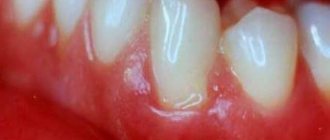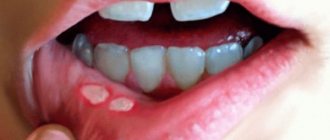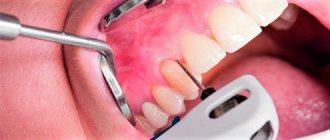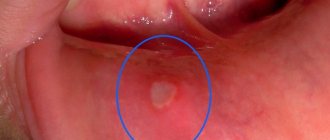During pregnancy, infectious diseases can directly or indirectly negatively affect the intrauterine development of the fetus. In most cases, herpes on the lips is safe for the health of mother and child. Severe consequences in the fetus occur during an active infectious process in the first trimester of pregnancy. A high risk of negative effects of the herpes virus on the fetus occurs when the protective forces of the mother’s immune system are suppressed and primary infection is acquired at the beginning of pregnancy.
Routes of infection
According to WHO, more than 90% of the world's population are infected with the herpes virus and are carriers of the infectious agent. Vesicular rashes on the lips are caused by herpes simplex virus type 1 (HSV-1). Primary infection in most cases occurs in childhood. After the virus enters the body, the immune system synthesizes specific antibodies that destroy the virus and prevent its replication. Stable lifelong immunity is formed.
A woman's fertile period begins at 18-20 years of age. By this point, in 98% of cases, immunoglobulins to the herpes virus circulate in the blood, which indicate the state of immune defense against infection. Less often, at the time of conception, the woman’s body has not encountered the infectious agent; therefore, there is no immunity to the herpes virus. Such pregnant women are at risk for intrauterine infection of the fetus.
There are several ways to get herpes.
Routes of infection:
- airborne (through saliva and discharge from bubbles on the lips when kissing, coughing, sneezing);
- contact household (through dirty hands, tableware, personal hygiene items);
- blood transfusion (during blood transfusion);
- sexual (during oral sex, infection of the genitals occurs).
After entering the body, the herpesvirus persists in the nerve cells of the spinal ganglia. This is a latent (dormant) state of vital activity of the infectious agent or carriage. When the body's defenses decrease (hypothermia, insolation, colds, stress), the virus enters the active phase and causes a relapse of the disease.
Treatment of herpes during pregnancy
During the period of exacerbation of the disease, treatment of labial herpes during pregnancy is carried out only with local agents that relieve the symptoms of inflammation and accelerate the healing of wounds on the lips. The use of folk remedies that alleviate the course of the disease is also allowed.
Preparations for external use are prescribed by the attending physician after conducting a diagnostic examination of the woman.
Diagnostics
After a visual examination of the patient, the doctor may prescribe additional studies to establish the timing of infection and identify possible threatening factors. Using PCR diagnostics, the type of pathogen is determined, and the presence of antibodies in the blood is determined using an enzyme immunoassay. Blood and urine tests are also performed to show the general condition of the pregnant woman.
Using PCR diagnostics, the type of pathogen is determined, and the presence of antibodies in the blood is determined using an enzyme immunoassay.
How to treat
Treatment of “colds” on the lips during pregnancy is carried out using local antiviral drugs that do not enter the bloodstream and do not harm the baby. The most common medications that can be used during pregnancy: Acyclovir ointment, Zovirax, Herperax, Interferon solution. They must be used several times a day from the moment the first symptoms of the disease appear.
What else to read What can be the consequences of herpes during pregnancy?
Additionally, you can lubricate the rash with a solution of Corvalol, which has an antiseptic and wound-healing effect. A cotton swab moistened with the solution is applied to the ulcers several times a day for 2-3 minutes. The solution can also be used on the oral mucosa.
To make wounds heal faster, it is recommended to use a solution of vitamin E or the drug Aevit.
Folk remedies
If the symptoms of the disease are mild, it is permissible to use alternative medicines that have anti-inflammatory and wound-healing effects:
- Aloe juice or raw potato. They have an anti-inflammatory, drying effect. Apply to the affected area several times a day.
- Tea, sea buckthorn or fir oil. Anti-inflammatory, regenerating effect.
- Calendula ointment. Has a softening effect.
- Propolis tincture. Disinfecting, wound healing effect.
- Toothpaste. Drying effect.
To enhance immune protection, it is recommended to take tinctures of ginseng, eleutherococcus, and echinocea.
Prevention
For women during pregnancy, it is important to avoid close contact with virus carriers in the active phase of the disease. You should use only individual household items and carefully observe personal hygiene. To strengthen the immune system, you need to ensure proper nutrition, maintain a sleep and rest schedule, avoid stress, spend more time in the fresh air, while avoiding hypothermia and overheating.
Clinical picture
Clinical signs of herpetic infection during pregnancy are the same as in non-pregnant patients. The classic course of the disease does not cause severe complications and does not disrupt the intrauterine development of the fetus.
The clinical picture occurs in 3 periods.
- The first period (prodromal) - the appearance of weakness, drowsiness, decreased ability to work, muscle pain, chills, fever up to 37.5 degrees, itching and burning in the lips.
- The second period (of active infection) is the formation of a grouped vesicular rash (bubbles with a diameter of 2-4 mm with transparent contents) in the lip area, which is accompanied by itching; after opening the vesicles, painful ulcers form.
- The third period (recovery) - brown crusts appear at the site of the ulcers; after the crust is rejected, they do not leave a scar or pigmentation, the general condition is normalized.
In immunodeficiencies, the consequences of primary infection or relapse of the disease lead to generalization of the infectious process. The virus spreads throughout the body through the bloodstream and causes viral inflammation of various organs and systems.
- Viral hepatitis.
- Atypical pneumonia.
- Damage to the organ of vision (keratitis, iridocyclitis).
- Encephalitis, meningitis, meningoencephalitis.
- Myocarditis.
A generalized infectious process leads to damage to fetal tissue and disruption of intrauterine development of varying degrees of severity.
Why is the 1st trimester of pregnancy a dangerous time for fetal damage?
In the first 3 months after conception, physiological changes occur in a woman’s body, which are aimed at carrying a pregnancy and giving birth to a healthy baby. The baby's cells contain DNA from both the mother and father. The immune system recognizes the latter as foreign proteins and prepares for rejection. To prevent the process of fetal rejection, physiological suppression of the immune system occurs in the early stages of pregnancy.
Herpes is extremely dangerous for the development of the fetus.
In the 1st trimester, organogenesis of the embryo occurs - all organs and systems are formed and rapidly develop. Against the background of suppressed immunity, infection or relapse of the disease occurs, the virus enters the blood, spreads throughout the body and can disrupt the intrauterine development of the fetus. Primary infection and exacerbation of the disease against the background of immunodeficiency conditions pose a danger to the life and health of the child.
Primary infection in the 1st trimester of pregnancy
Herpes on the lip during pregnancy in the 1st trimester has a negative effect on the development of the fetus during primary infection. The virus enters the blood and spreads unhindered throughout the body, including getting into fetal tissue. At the time of primary infection, the body has no defense mechanisms against infection - stable immunity is developed after 4-10 days. During this time, the causative agent of the disease can cause irreparable damage to the child’s health.
The expectant mother should treat herpes, and as soon as possible.
Primary infection in the first 3 months of gestation causes the following consequences:
- placental abruption, fetal hypoxia;
- spontaneous miscarriage;
- frozen pregnancy;
- stillbirth;
- congenital malformations of internal organs;
- microcephaly (underdevelopment of the brain);
- damage to the organ of vision;
- delayed mental development of the child after birth.
Severe malformations are often incompatible with life and cannot be treated surgically. The mortality rate for neonatal herpes is high. Intrauterine infection of the fetus with a healthy maternal immune system rarely occurs, even with primary infection at the beginning of pregnancy. Severe consequences for a child develop with immunodeficiencies (primarily HIV/AIDS), oncology, vitamin deficiency, or taking immunosuppressive treatment (cytostatics, glucocorticoids, chemotherapy drugs).
Is there any danger
Often, the herpes virus is already in a woman’s body, that is, the infection occurred long before conception, but is in a latent state. Cold sores can appear at any stage of pregnancy. This depends on the degree of decreased immunity and the presence of provoking factors.
In the first trimester
If the presence of a virus in a pregnant woman’s body is established, and it appears on the lips in the early stages, there is no danger for either the expectant mother or the child. The reason is that the woman has already developed immunity to the action of the pathogen. In this case, the manifestations of herpes can be eliminated with the help of topical medications.
In the second and third trimesters, HSV (herpes simplex virus) is also not dangerous if the infection occurred before pregnancy.
The threat arises if a pregnant woman catches the virus for the first time. Antibodies do not have time to be produced during primary infection, so the body does not have the ability to fight the pathogen in a timely manner.
Symptoms of primary herpes infection are severe:
- small itchy blisters on the lips and nose;
- itching in the eyes and damage to them, if, for example, you scratch with unwashed hands;
- general malaise.
Consequences for the embryo:
- development of congenital malformations of internal organs, since in the 1st trimester the formation of all systems occurs;
- spontaneous termination of pregnancy due to the incompatibility of pathologies in the fetus with life.
In the second trimester
The primary herpes virus in the second trimester is also dangerous for the fetus. At this stage, all the main internal organs have already been formed, but continue to develop.
Possible consequences:
- malformations of individual organs;
- damage to the central nervous system of the fetus, which completes its formation by the 20th week;
- ovarian damage in girls;
- pathologies of the musculoskeletal system in the fetus.
In the third trimester
Primary infection with herpes in the 3rd trimester can have the following consequences for the child:
- pathologies of the respiratory system;
- damage to the organs of vision and hearing;
- risk of fetal infection during childbirth;
- delayed mental development in the future.
Severe manifestations of herpes infection can cause premature birth. In some cases, doctors decide on giving birth ahead of schedule if the fetus is already viable.
For mother
The consequences for a pregnant woman are no different from those if she had fallen ill before conception. The herpes virus causes exactly the same manifestations on the lips as before. The difference is in the severity of the infection.
Due to weakened immunity, the rash on the mucous membranes may last longer. If herpes appears on the lip, it can spread to the wings of the nose, the mucous membrane of the nasal passages, and affect the entire nasolabial triangle. In severe cases, ophthalmoherpes develops, that is, damage to the eye by the virus. It is possible to develop genital herpes, which affects the mucous membrane of the external genitalia.
Recurrence of the disease in the 1st trimester of pregnancy
Exacerbation of latent herpetic infection occurs against the background of decreased immunity, which is typical during early pregnancy. Activation of the virus is accompanied by the movement of the infectious agent from nerve cells to the area of the primary lesion: the upper and lower lip, the skin of the nasolabial triangle, and the oral mucosa. The herpes virus reaches its preferred location along the axons of neurons and does not enter the fetal tissue.
Relapse of the disease is usually milder than the initial infection. Exacerbation of the disease in the vast majority of cases is not dangerous for the intrauterine development of the fetus. During this period, you cannot engage in self-treatment. Drugs against herpes have a teratogenic effect - they affect fetal tissue and cause the formation of congenital malformations. A gynecologist will tell you how to treat the disease. Taking antiviral drugs without the supervision of a specialist can cause more harm to the child’s health than a herpes virus infection.
Treatment tactics
How to treat herpes on the lips during pregnancy depends on the severity of the disease and the state of the immune system of the expectant mother. For mild cases of the disease, therapy is not required, or local treatment is prescribed in the form of ointments and gels to lubricate the rash on the lips.
- Bonafton.
- Acyclovir.
- Panavir.
- Viru-merz serol.
- Depanthenol.
- Tebrofen ointment.
D-Panthenol for external use.
In case of severe infection against the background of immunodeficiency, antiviral and immunomodulatory therapy is used for oral administration.
- Acyclovir.
- Zovirax.
- Vivorax.
- Valtrex.
- Famvir.
- Anaferon.
- Cycloferon.
- Gamma globulin.
- Immunal.
Antiviral systemic treatment is prescribed for health reasons in the case of a serious condition of a pregnant woman. The prognosis for the child's health and life remains unfavorable. High risk of stillbirth, spontaneous miscarriage, and the formation of severe malformations, often incompatible with life.
How to treat cold sore lips
Measures to relieve a pregnant woman from the symptoms of a herpetic infection, first of all, should be carried out taking into account not to harm the fetus. Usually, local treatment of the disease is carried out with special antiviral ointments that can quickly eliminate signs of the disease in the perioral area.
The most effective remedy against colds on the lips is Acyclovir, as well as medications containing it. The most common ointments for herpes:
- Vivorax;
- Zovirax;
- Herpetad;
- Acigerpin.
Other topical treatments that have an antiviral effect:
- Fenistil;
- Viferon;
- Penciclovir;
- Biopin;
- Tykveol;
- Oxolinic ointment;
- Lomagerpan.
Separately, we can mention Zovirax ointment, which is an analogue of Acyclovir. This is the most effective remedy that can quickly and painlessly relieve a woman from signs of infection on her lips. Many people doubt how safe this remedy is for the development of the unborn baby. It has been established that the benefits of this medication outweigh the possible risk to the health of the fetus. After all, the virus is much more dangerous for a child than the active ingredient in this ointment. Zovirax can be used already in the first three months of pregnancy without fear for the normal development of the embryo.
If there are many rashes, and the disease itself is very severe, then it is advisable to prescribe antiviral drugs for oral administration. Acyclovir tablets are usually used, after treatment with which the symptoms of colds on the lips disappear very quickly. Since the development of the disease in question occurs against the background of reduced immunity, it is necessary to take active measures to strengthen it.
So, the basic principles of treating herpes on the lips during pregnancy:
- Taking vitamin complexes and ascorbic acid to restore the immune system.
- The use of antiviral and antiherpetic ointments and gels for application to elements of inflammation.
- The use of special drugs that have a strengthening effect on the immune system, for example, Viferon rectal suppositories, Grippferon nasal drops, etc.
- Taking antiviral drugs in tablet form, if necessary.
- Eliminating stressful and conflict situations, ensuring a good night's sleep and daytime rest.
- Proper and balanced nutrition that provides the pregnant woman’s body with all the necessary vitamins, minerals and trace elements.
The outcome of pregnancy is usually determined by its timing. If infection occurs in the first three months, then abortion is recommended. In the second trimester, adequate and gentle treatment is necessary. At later stages, delivery by cesarean section is allowed.
Prevention
To prevent primary infection at the beginning of pregnancy, it is necessary to follow preventive measures.
- Avoid communication with patients in the active phase of herpes infection.
- Minimize visits to public places with large crowds of people.
- Eat rationally.
- Give up bad habits, including passive smoking.
- Avoid hypothermia, overheating, stressful situations.
One of the methods of preventing the disease is a balanced diet.
To prevent infection before conception, women are prescribed gamma globulin to increase the body's resistance to the herpes virus. During pregnancy planning, it is necessary to undergo an immunological examination to determine the strength of immunity against HSV-1.
The herpes simplex virus, which causes a rash on the lips, is not always dangerous during pregnancy. Timely implementation of therapeutic and preventive measures against infection and relapse of infection prevents the formation of severe developmental defects in the child.
Tweet
Pin It
Tags:Pregnancy
- Causes of frequent herpes rash on the lips
- What to do if herpes appears on the lips while breastfeeding?
- How to effectively treat herpes on the lips
- How to treat herpes on the lip during pregnancy: 2nd trimester
Causes
Herpetic infection on the lips is transmitted through household contact or airborne droplets. Almost all people encounter this virus during their lives, but it becomes active only when the body’s protective properties are significantly reduced. During pregnancy, a woman's immune system is weakened and the herpes virus easily attacks her body.
Factors that provoke activation of the virus are:
- hypothermia or overheating;
- previous acute respiratory viral infections and influenza;
- exacerbation of chronic diseases;
- stress loads and disturbances in psycho-emotional state;
- hormonal imbalances;
- alcohol intoxication;
- microtraumas on the lips and oral mucosa.
What else to read: The appearance of herpes during pregnancy in the 3rd trimester
A cold on the lips of a pregnant woman caused by primary herpes indicates a high degree of danger for the unborn child and is fraught with intrauterine death of the fetus or possible pathologies in its development.











